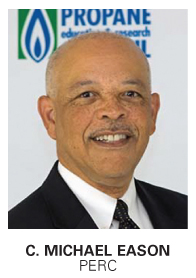Thursday, January 26, 2017
JEFFERSON CITY, Mo. (January 26, 2017) — In the Missouri first regular legislative session, a bill was filed by Rep. Craig Redmon, Missouri's first attempt to allow unattended propane refueling for dispensing stations that have the new quick-connect nozzle.

 C. Michael Eason has joined the Propane Education & Research Council (PERC; Washington, D.C.) staff as director of budget and finance. He will replace Jim Harris, PERC’s CFO and vice president of administration for the past 11 years, who will retire at the end of 2016. Most recently, Eason was CFO at Intelligent Transportation Society of America.
C. Michael Eason has joined the Propane Education & Research Council (PERC; Washington, D.C.) staff as director of budget and finance. He will replace Jim Harris, PERC’s CFO and vice president of administration for the past 11 years, who will retire at the end of 2016. Most recently, Eason was CFO at Intelligent Transportation Society of America.